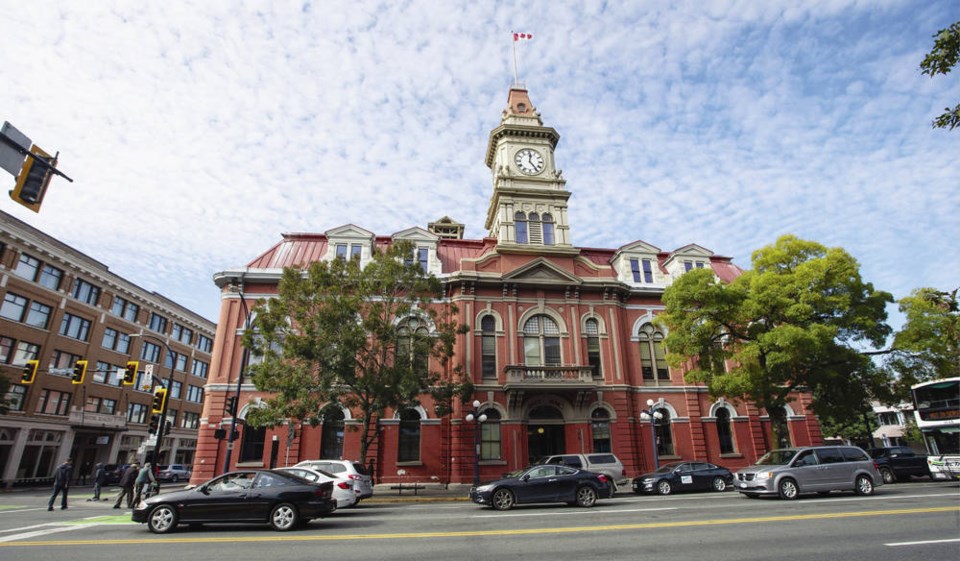As an internationally acknowledged expert on the creation of healthier cities and communities, I have been observing with both bemusement and concern the furor in this newspaper’s letters page over Victoria city council’s actions on bike lanes, homelessness, affordable housing and the like.
Bemusement because it seems to me that in many ways, what council is trying to do is create a more sustainable, livable and healthy city in line with the best practices found in many European and some North American cities, emphasizing walking, biking and strong neighbourhoods.
I don’t hear many visitors to cities such as Copenhagen or Amsterdam — or the many livable cities like them in Europe that are more Victoria-sized — come away saying: “What this place needs is more cars and parking.”
For far too long, the automobile has been king in our cities, causing air and noise pollution, injuries and deaths, and contributing to inactivity and climate change. It is time it was dethroned.
Victoria council is also trying with humaneness and compassion to deal with a perfect storm of homelessness and mental-health and substance-use problems, aggravated by COVID-19. These are problems that were not created by the city in the first place, but by other levels of government over the past decades.
It was the provincial government that closed the mental-health institutions and then failed to put in place adequate funding and support for community care, as retired social workers Joni Hockert (March 8) and Gail Simpson (March 18) pointed out in compassionate and outraged columns.
It was Health Canada and the medical profession that failed to protect Canadians from the pharmaceutical industry’s unethical marketing of opioids and the inappropriate prescribing by physicians, which led to the opioid crisis.
It was the federal and provincial governments who abandoned social housing in the 1990s and allowed minimum wages and social assistance to stagnate, leading to the crisis of unaffordable housing. And it was the courts that quite properly gave people the right to camp in the parks in the absence of other and better shelter.
My concern is that the criticism is getting out of hand, with a nasty edge to it. In the eyes of some, nothing that the mayor and the majority of council do is right, and the anger and vituperation heaped upon them is intemperate and excessive.
Yet despite what letter writer Bob Beckwith wrote on March 26, it is not the minority ruling the majority. I think he confuses the people who write angry letters to the Times Colonist — many of whom do not live in Victoria — with the voting public.
In the 2018 election, Mayor Lisa Helps got 12,642 votes, 43 per cent of the total, almost 4,000 votes more than her nearest rival, Stephen Hammond, of NewCouncil.ca. As to council members, Ben Isitt and Jeremy Loveday topped the polls and three members of Together Victoria were also elected. Meanwhile, not one of the four NewCouncil.ca candidates was elected.
Moreover, turnout was almost 45 per cent of eligible voters, which is quite high for municipal elections. In this region, only Oak Bay (53.6 per cent) and Sidney (48.4 per cent) had higher turnouts, while Metchosin and North Saanich almost matched Victoria.
The rest had turnouts ranging from 25 to 41 per cent, while the nadir was Langford (18.5 percent) and Highlands, where the mayor and council were acclaimed without a vote. So if turnout is an indication of the legitimacy of an election, there has to be doubt about the legitimacy of many councils other than Victoria’s in this region.
Lawrie McFarlane wrote on March 21 that people need to “take back our city.” Take it back from whom? The people who care about sheltering those who are homeless, vulnerable and distressed? Who want to create more walkable, bikeable, livable communities? Who are trying to protect and restore the environment for future generations?
I may not agree with every decision Victoria council has made, but I have never doubted that the council is doing its best in challenging circumstances.
People may not like the results of the election or the decisions made by Victoria council, but it’s called democracy and it’s better than all the alternatives.
thancock@uvic.ca
Dr. Trevor Hancock is a retired professor and senior scholar at the University of Victoria’s School of Public Health and Social Policy.



